Director
Dr Soledad García Ferrari
Edinburgh College of Art
Dr Soledad Garcia Ferrari is a Senior Lecturer at ESALA University of Edinburgh. Professionally qualified in Architecture and Urbanism in Uruguay, her research focuses on current processes of urban development and regeneration in Latin America and Europe. She was awarded her PhD in Urban Studies in 2007 at the School of the Built Environment Heriot-Watt University. Soledad has extensive expertise on research in recent planning strategies in Medellin and is currently leading Medellin Urban Innovation project awarded by British Council. She taught in the Faculty of Architecture in Montevideo, the University of Seville and was invited speaker to the School of Architecture, CEU in Madrid. She is currently University of Edinburgh Dean Latin America and Director Edinburgh University Centre for Contemporary Latin American Studies.
Staff

Dr Magnus Course
Social Anthropology, School of Social and Political Science
His research is concerned with the relations between kinship, personhood, power and language in the context of Native South American socialities. His doctoral thesis examined the Mapuche of southern Chile and he is the author of the book Becoming Mapuche: Person and Ritual in Indigenous Chile.
He currently supervises three Chilean PhD students, all of whom are fully funded by Chilean state scholarships. Dr Course collaborates with Chile's two largest universities, Universidad de Chile and Universidad Católica, and is the international evaluator for the latter. He has also collaborated extensively with anthropologists in Brazil and spent his 2011 sabbatical affiliated to the Federal University of Rio de Janeiro.
He is currently developing a major grant proposal for the FAPESP-RCUK (Fundação de Amparo à Pesquisa do Estado de São Paulo) awards, with his colleague Pedro Cesarino at the Universidade Federal de Sao Paulo.

Dr Casey High
Social Anthropology, School of Social and Political Science
Casey High’s research focuses on violence, history and indigenous political movements in Latin America. His ongoing fieldwork combines ethnographic and historical perspectives on violence and the transformation of inter-ethnic relations in the Ecuadorian Amazon. His research interests also include language, indigenous rights and the interface between cosmology and development.
His forthcoming monograph, based on fieldwork in Waorani communities in the Ecuadorian Amazon, relates indigenous forms of memory to representations of Amazonian violence in colonial history, missionary texts and contemporary cinema. He is also co-editor of two books on contemporary anthropological theory and practice. These include How Do We Know? Evidence, ethnography, and the making of anthropological knowledge (2008) and The Anthropology of Ignorance: Ethnographic Perspectives (2012).
Before joining Edinburgh he was a postdoctoral researcher at the CNRS in Paris, and a lecturer in anthropology at Goldsmiths, University of London. He is currently involved in a collaborative project to document the Waorani language.

Maya Mayblin
Social Anthropology, School of Social and Political Science
Maya Mayblin is a senior lecturer in Social Anthropology. For the past 20 years she has carried out research in Northeast Brazil, largely among rural and semi-rural communities in the interior of the State of Pernambuco. She is the author of numerous articles in peer-reviewed journals, the monograph Gender, Catholicism, and Morality in Brazil: virtuous Husbands, powerful wives (2010, Palgrave Macmillan), and co-editer with Norget and Napolitano of The Anthropology of Catholicism: a reader (University of California Press, 2017). Her research spans politics, gender, ritual, and religion and her writing often explores the existential tensions and implications of Christian practice for Brazilian forms of citizenship and political action. She is currently completing a second monograph that deals with the history of Catholic priest involvement in local party politics.
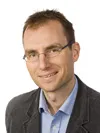
Francisco Ascui
Business School
Francisco’s research focuses on two areas: carbon accounting and the implications of carbon market design for private sector investment. Issues of particular interest include the development of new market mechanisms (and accounting methods) in sectors such as reduced deforestation (REDD/REDD+), biochar and carbon capture and storage (CCS), and related matters such as carbon risk management and regulation.
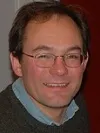
Dr Iain Hardie
Politics and International relations, School of Social and Political Sciences
He has worked extensively on the Brazilian financial system in comparison to Lebanon and Turkey in 2011 & 2012.
Dr Shawn Harmon
School of Law
Dr Harmon works primarily on medical law and biolaw, the interaction between law and bioethics, and the regulation of health research and emerging technologies. He has recently completed an ESRC-funded project called ‘Governing Emerging Technologies: Social Values and Stem Cell Research in Argentina’, which has resulted in a number of publications. Dr Harmon is currently pursuing further research and funding opportunities with colleagues from the University of Buenos Aires and the Ministry of Science, Technology & Innovative Production.

Dr Geoff Gregson
Business School
An expert in Entrepreneurship and Innovation, Dr Gregson's is active in a number of international research and commercialisation initiatives in the European Union, Colombia, Uganda and Sri Lanka and actively present at international conferences and workshops to academics, practioners and policy-makers. He has experience as business consultant and analyst assisting new technology-based companies in securing investment, market analysis, team building, business strategy, etc. Columbia is one of his main interests, and he has worked and is working on a series of academic projects with Colombian universities. His book Financing New Ventures: An Entrepreneur’s Guide to Business Angel Investment Business (2014) centres on entrepreneurial finance in Colombia.
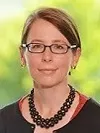
Dr Kristen Hopewell
Politics and International Relations, School of Social and Political Sciences
Dr Hopewell’s research focuses on global political economy, globalization, trade and development. Her current research analyzes the rise of new powers from the developing world - such as Brazil, India and China - who are challenging the longstanding dominance of the US and other advanced-industrialized states in the global economy and its governing institutions. She was previously an Assistant Professor at the University of British Columbia, a post-doctoral fellow at the Max Planck Institute for the Study of Societies in Cologne, Germany, and completed her PhD at the University of Michigan.

Professor Mark Aspinwall
School of Social and Political Sciences
Professor Aspinwall is an expert on rule of law/corruption in Mexico. His latest book Side effects: Mexican governance under NAFTA’s labor and environmental agreements (Stanford UP, 2012) examines how Mexico is evolving, as changes take place in domestic politics, and outside influences (primarily from NAFTA) are increasingly being felt in Mexican society.

Professor Claudio Michelon
School of Law
Professor Michelon is an expert on Brazilian private law. His is the author of a book on the Brazilian Law of unjustified enrichment (Direito Restituitório, RT, 2006) and of many articles covering a range of subjects within Brazilian Private Law. Professor Michelon is also engaged in collaboration with Brazilian legal theorists, in particular at the Universities of São Paulo and Rio Grande do Sul, as well as the Getúlio Vargas Foundation.
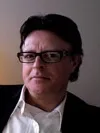
Professor Richard Williams
Edinburgh College of Art
Professor Williams is an expert on twentieth-century urbanisation in Brazil, particularly the development of Brasilia. His publications include the book Brazil: Modern Architectures in History.
Professor Paul Jenkins
Edinburgh College of Art
An architect, planner and social scientist, Professor Jenkins has worked in Brazil since heading a Higher Education Link with the University of Brasilia when in the ECA School of Planning & Housing (2000). He has developed a strong relationship with the University of Sao Paulo (USP) since 2005. This led to his hosting (in 2007) Prof Alex Abiko, the Head of Department of Civil Construction Engineering (DECC) at the ‘Escola Politécnica’ (Engineering School) in USP at the School of the Built Environment, Heriot-Watt University (where he is 0.5 FTE). This then led to a subsequent role as Visiting Professor at that department 2007-2011. This activity expanded to include a concurrent Visiting Professor role at the Faculty of Architecture & Urbanism (FAU) at USP in 2009-1, where his main link was Head of Faculty Prof Marcelo Romero (this reflecting Prof Jenkins’ 0.5 FTE at ESALA, ECA, University of Edinburgh). Other than work within his subject areas with Brazilian contacts (i.e. architecture, built environment & planning) Professor Jenkins’ visits have included presenting information on research assessment processes in the UK to various Vice-Rectors of the university (Hélio Nogueira da Cruz; Vahan Agopyan) as well as the Director of the Escola Politecnica (José Roberto Cardoso). Professor Jenkins speaks fluent Portuguese and has a good understanding of how the Brazilian higher education system operates.

Dr Maria-Chiara Ferrari
School of Engineering
Gas-separation process on offshore gas-exploration platforms. In collaboration with University of Fortaleza (Brazil) and University of Malaga (Spain).

Professor Julie Cupples
School of Geosciences
Dr Julie Cupples has published extensively on Nicaraguan cultural politics, covering questions of development/postdevelopment; geographies of neoliberalism, gender and sexuality; disasters and environmental risk; municipal governance; elections and indigenous media. She is the author of Latin American Development (Routledge, 2013) and is the co-PI on a Marsden-funded grant Geographies of Media Convergence that involves research with community mediamakers on Nicaragua’s Atlantic Coast.
Dr Eliza Calder
Volcanology, School of Geosciences
Dr Eliza Calder has published extensively on the broad area of volcanic hazards including topics such as the dynamics of the physical processes, probabilistic hazard analysis, and the development of risk assessments and mitigation strategies. Much of her work has focused on applications in Latin America and the Caribbean including Mexico, Guatemala, Colombia, and especially, Chile. She has previously worked for, and has longstanding collaborations with the Chilean Geological survey, and currently provides advice on volcanic hazard mapping to the Colombian Geological Survey. Eliza is leader of the International Association of Volcanology and Chemistry of Earths Interior Commission on Volcanic Hazards and Risk and has broad interests across the themes of Volcanoes, Natural Hazards, Environment and Society.
Professor Patrick Meir
School of Geosciences
Professor Meir’s research on ESPA (Ecosystem Services for Poverty Alleviation) has a focus on how forest ecosystems can be managed so that communities can harness ecosystem services to enhance their well-being. He has conducted a range of case studies in Brazil.
Dr Frank Mayle
School of Geosciences
Dr Mayle’s research analyses the Amazonian basin and humid tropics particularly in Bolivia. A recent research grant allowed him to examine pre-Columbian human land use and impact in the Bolivian Amazon area.
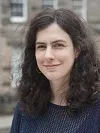
Dr Iona Macintyre
School of Literatures, Languages, and Cultures
Iona is currently working on the circulation of Scottish Enlightenment texts in independence-era South America.
Iona's broad research interests lie in the writing, history, and culture of nineteenth century Spanish America and Brazil. She works primarily on Spanish American independence, Argentina, history of the book, gender studies, and transatlantic relations.

Dr Marisa Wilson
School of Geosciences
Marisa's research relates large-scale projects to improve food systems in Latin America and the Caribbean to localized experiences, understandings and practices of food production, exchange and consumption. She completed her doctorate in social anthropology in 2009 (Oxon), and is presently exploring crossovers between social anthropology and human geography. Her principal research interests lie in political economic, moral and cultural ideas of food, ethical consumption, and social justice at local, national and global scales, especially in regards to the uneven historical development of globalisation. Her doctorate was a theoretical and ethnographic exploration of the 1990s' shift in food provisioning practices in Cuba. She has recently published an ethnographic monograph on this theme, entitled Everyday Moral Economies: Food, Politics and Scale in Cuba (2014), which draws from work in economic anthropology as well as human geography. Marisa is currently commencing a broad research project comparing food networks, consumer values and nutrition transition in Cuba, Venezuela and Trinidad and Tobago (and, eventually, their former colonizers, Spain and the United Kingdom) and continuing to explore crossovers in geography and anthropology.
Professor Rachel Wood
School of Geoscience
Professor Wood is currently working on a £1.8m project for Petrobras and BG Group Plc to improve the recovery of hydrocarbons, such as oil, from carbonate reservoirs. Extraction rates can be as low as 20%, so an obvious demand exists to improve such techniques. Part of the International Centre for Carbonate Reservoirs (ICCR), a collaboration with Heriot-Watt University. This particular project also involves staff from Universidade Estadual do Norte Fluminense ‘Darcy Ribeiro’ (UENF) and Universidade Federal de Santa Catarina (UFSC), in Florianópolis.
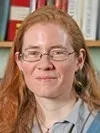
Dr Fiona Mackintosh
School of Literatures, Languages, and Cultures
Dr Fiona Mackintosh is a Senior Lecturer in Latin American Literature and currently Programme Director of the MSc in Comparative Literature at Edinburgh. Her research interests lie in 20th century and contemporary Argentinian fiction and poetry, and in literary translation. She holds an MA Hons from the University of Cambridge in Music and Modern Languages, an MPhil from the University of Oxford in Modern Languages, and a PhD from the University of Warwick in Comparative Literature. Recent and forthcoming publications include book chapters on Silvina Ocampo (2012, 2016), and articles on Guillermo Martínez (2017), Alicia Kozameh and Claudia Piñeiro.
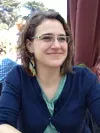
Dr Charlotte Gleghorn
School of Literatures, Languages, and Cultures
Dr Charlotte Gleghorn is Lecturer in Latin American Film Studies and joined the University of Edinburgh as Chancellor’s Fellow in September 2013. Her research interests lie in the field of Latin American Film Studies, with a particular emphasis on the political work of cinema and its relationship to identity and processes of memory. She has worked specifically on women’s cinema from Latin America, Colombian cinema, and Indigenous and Afro-descendant filmmaking. Prior to joining Edinburgh, she worked as Postdoctoral Researcher on the European Research Council project ‘Indigeneity in the Contemporary World: Performance, Politics, Belonging’ project, hosted at Royal Holloway, University of London.
In 2017-18 she worked as Co-I on the AHRC International Network, ‘Afro-Latin (in)visibility and the UN Decade: Cultural politics in motion in Nicaragua, Colombia and the UK’. Through a series of events held in Nicaragua, Scotland, Colombia and the San Andrés archipelago, we analysed the main challenges facing Afro-descendants, with a view to developing strategies to counter racism and discrimination, enhance visibility within national polities, and cultivate and fortify Afro-descendant media and film production. This research has recently been awarded Follow-on Funding by the AHRC/Global Challenges Research Fund to develop media content that focuses on oral narratives of belonging between the San Andrés archipelago, the Nicaraguan Creole Caribbean coast, and mainland Colombia.
In 2018 Charlotte was awarded an AHRC Leadership Fellowship to pursue her research in Indigenous filmmaking from Latin America further.
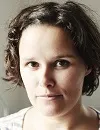
Dr Raquel Ribeiro
School of Literatures, Languages, and Cultures
Dr Raquel Ribeiro took a BA in Journalism and Communication Sciences at Universidade Nova de Lisboa, in Portugal, followed by a PhD in Hispanic Studies at the University of Liverpool. She was the first recipient in the Humanities of the Nottingham Advanced Research Fellowship (2010-2012), at the University of Nottingham, where she developed the postdoctoral project: “War Wounds: Cultural representations of the Cuban presence in the Angolan civil war”. She is a member of the Cuba Research Forum, in the University of Nottingham. She taught Brazilian Literature at the University of Oxford before joining the department of Spanish, Portuguese and Latin American Studies at Edinburgh in 2014. Raquel’s main areas of research are in Lusophone literatures and cultures, and Trans-Atlantic intellectual and cultural exchanges between Lusophone countries and Latin America, and Comparative Literature. She is currently preparing a monograph on Cuban literature and film of the Angolan war.

Dr Carlos Soler Montes
School of Literatures, Languages, and Cultures
Carlos’ research interests lay in the field of Hispanic Sociolinguistics and Applied Linguistics. He is particularly interested in the area of language variation from a pan-Hispanic and pluricentric perspective and how this variation can be dealt with by native speakers, as well as learners of Spanish and new speakers of the language. His research reflects upon the limits of the Spanish language norm, the regional uses among different Latin American regions, how they manifest and vary, their particularities, connections and contacts with other languages from the Americas, like Quechua. He has always been interested in investigating the role of language acquisition and learning in processes of language change too, reflecting on how to manage language variation phenomena within second language teaching and learning situations, as well as the development of the Sociolinguistic Competence during the second language acquisition process.
Professor Peter A. Furley
Department of Geography
Professor Furley and his colleagues (inc Professor Patrick Meir and Dr Frank Mayle in GeoSciences and Dr Toby Pennington in the RBGE) work in partnership with the University of Belize on the Savannah Ecosystem Assessment. The aim of their research is to identify priority areas for conservation within the lowland savannahs of Belize.
Research area: tropical soils and plant - soil linkages, especially in the savannas. Agricultural development based on environmental and human resources.
Principal areas; Central America, particularly the Maya region and Belize; Brazil, particularly the cerrado and Amazonia.
Dr Miguel Paredes Maldonado
Edinburgh School of Architecture and Landscape architecture (ESALA), Edinburgh College of Art
Miguel’s work deals with the conceptualisation and implementation of alternative frameworks for data-driven urban technologies, critically contesting current hegemonic practices and exposing their reductive, top-down approach to the complexities of urban life.
In contrast to the managerial approach of established Smart City models in Europe and North America, Latin American cities such as Medellín and Santiago de Chile are gradually embracing the potentials of bottom-up, citizen-led forms of urban “smartness” that both foreground and empower the multiplicity of individual agencies and subjectivities that underpin city life. Working within the fields of Urban Hacking and Critical Making, these Open Source initiatives champion a DIY ethos and deal with urban subjectivities in ways that are both spatially and politically meaningful for collective citizenship, with a view to resituating them as the locus of design agency in the urban field.

Dr Julia Calvert
Politics and International Relations, School of Social and Political Science
Her areas of interests are political economy, foreign investment, international trade, international investment law, extractivism and foreign economic policy. She is currently working on two projects in the region. One concerns the political economy of investor-state disputes in Latin America and the other focuses on the social construction of corporate nationality amongst mining companies in the region.
Dr Jessica Gordon-Burroughs
School of Literatures, Languages and Cultures
Dr. Gordon-Burroughs received her Ph.D. and B.A. from Columbia University. Her research and teaching focuses on book and film materiality and media studies in Latin/o America.

Dr Jacob Blanc
School of History, Classics and Archaeology
History of modern Latin America, with an emphasis on Brazil and rural communities. In my work I explore social mobilizations, political identity, and agrarian reform movements in the Brazilian countryside. Other related research interests include the history of dictatorship and authoritarian regimes across Latin America, human rights, environmental history, and questions of social memory and memory studies. Research project on the history of the Itaipu hydroelectric dam on the Brazil-Paraguay border from the 1960s through the 1980s, using the case study of displaced farmers, peasants, and indigenous groups to understand how Brazil's military regime was experienced and contested in the countryside.
The onjoing project consist on the Prestes Column rebellion in the 1920s, one of the most mythologized events in Brazilian history. From 1924 to 1927, a group of junior army officers led by Luíz Carlos Prestes marched nearly 25,000 kilometers across Brazil’s vast interior regions. The Prestes Column did not succeed in bringing down the government, but it captivated national attention and galvanized momentum for what would soon become the Revolution of 1930. While the Prestes Column has inspired dozens of popular and academic works, this project proposes an entirely original framework. Rather than treat the Column’s passage through the interior as a backdrop to the rebellion, it focuses on the interior regions themselves, exploring how the country’s so-called ‘backlands’ served as both a place and a concept in the formation of modern Brazil.

Dr. Barbara Fernandez Melleda
School of Literatures, Languages and Cultures
Dr Bárbara Fernández Melleda is currently a Teaching Fellow in Spanish at The University of Edinburgh. Her work focuses on Chilean women’s poetry, neoliberalism, cartonera publishers and material culture. She has been an active member of CCLAS since 2014 and helped organise the 2018 Latin American Colloquium, inviting Chilean Mapuche scholar Dr Luis Cárcamo-Huechante from The University of Texas at Austin. CCLAS has supported book launches for La Joyita Cartonera, where Dr Fernández works as a prologist ad honorem.
Dr Meha Priyadarshini
School of History, Classics and Archaeology
Dr Meha Priyadarshini is a Lecturer in Early Modern History at the School of History, Classics and Archaeology at Edinburgh. She works on connections between colonial Latin America and Asia in the early modern period.
The first project traced the connections between China, the Philippines and Mexico through the trade of Chinese porcelain. She is continuing with the focus on material culture studies with the next project, which is on Asian textiles and the historical narratives created through them in colonial and post-independence Mexico.
Dr Aaron Kappeler
School of Social and Political Science
Aaron Kappeler is a Lecturer in the Anthropology of Development. His research focuses on the politics of natural resource extraction and agriculture in Latin America. For the past ten years, he has carried out fieldwork in Venezuela with small-scale coffee growers in the Andes and large-scale, agro-industrial enterprises in the western plains. His most recent articles deal with the topics of resource nationalism, infrastructure, environment, and populist politics. He is currently studying labor migration in the wake of Venezuela’s ongoing political and economic crisis. Prior to joining the University of Edinburgh, he was a Visiting Assistant Professor in the Department of Anthropology at Union College, a postdoctoral fellow in the Institute for Advanced Study at Central European University, and an adjunct lecturer in the Department of Anthropology at the University of Toronto.
Associate researchers

Dr Mario Parra Rodríquez
Department of Psychology
Dr Parra Rodríguez is a joint researcher on Alzheimer’s Disease with Professor Francisco Lopera, director of the Neuroscience Group of the University of Antioquia, Colombia.
Dr Toby Pennington
School of Biological Sciences
Dr Pennington is Head of the Tropical Diversity section of the Royal Botanical Garden Edinburgh (RBGE) and teaches Phylogenetics, Plant Geography and Leguminosae to MSc and undergraduate students at Edinburgh. The research done by RGBE in Latin America - and the wider programme at RBGE - has grown considerably in recent years. Dr Pennington secured several grants in 2011 (from UK Natural Environment Research Council, Leverhulme Trust and US National Science Foundation). RBGE now has six Latin American PhD students - from Chile, Peru & Colombia - with the majority registered at the University of Edinburgh. In addition to this, senior scientists from Mexico and Brazil recently spent sabbatical years there. RGBE’s Brazilian work is expanding quickly, with five Brazilian PhD students visiting on ‘sandwich’ grants funded by the Brazilian government, with more to follow and a senior Brazilian botanist coming here for a one year sabbatical. Much of Dr Pennington’s work is focussed on Peru, looking at issues such as reforestation in both the Andes and Amazon areas. On May 1st 2012 a new project begins, which seeks to catalogue and increase awareness of the importance of Seasonally Dry Tropical Forests (SDTF), which occur across South America and which are under threat from agriculture. These highly-sensitive areas contain a wealth of flora, but have been poorly protected by governments and have suffered as the “poor cousins” of the better known and better protected Amazonian rainforest areas.

Professor Erik Camayd-Freixas
Florida International University
Professor Erik Camayd-Freixas is Professor of Hispanic Studies, Graduate Program Director, and Director of Translation Studies at Florida International University. A Harvard-trained communications analyst, social theorist, and expert linguist at federal and state courts, Professor Camayd has testified before Congress, contributed as amicus curiae to the U.S. Supreme Court, and received human rights awards from the American Immigration Lawyers Association, the Florida Immigrant Advocacy Center, the Guatemalan Foreign Ministry, and the National Association of Criminal Defense Lawyers. He has interpreted for ten heads of state, including President Obama and Pope Benedict XVI. He is the author of numerous books and articles on Latin American culture and literature.

Professor Gustavo Vega-Cànovas
El Colegio de México
Professor Gustavo Vega-Cánovas holds a PhD in Political Science from Yale University and a Law degree from the National University of Mexico. He is a professor in the Center for International Studies at El Colegio de Mexico of which he was also the Head during 2005 and 2011. He specializes in US bilateral Relations and North American integration. He has taught at Brown, the Center for Research and Teaching in Economics (CIDE), Duke, the University of North Carolina at Chapel Hill, the University of Texas at Austin, and Yale. His research over the last 15 years focuses on North American integration, the most recent product of which was the book titled The North American Free Trade Agreement: a Historical Perspective and Challenges for the future (2010). He is the author of more than 40 articles, and co-author of 5 more books on North American issues. He has been a recipient of multiple awards like the Woodrow Wilson Public Policy Fellowship, the Fulbright Scholarship, the MacArthur fellowship, the Inter-American Foundation fellowship, the Yale Fellowship, and the Colegio de Mexico Fellowship. He is a member of the National System of Researchers (SNI) of the Education Ministry of Mexico.

Dr Magda Sepulveda Eriz
Pontificia Universidad Católica de Chile
Magda Sepúlveda is Associate Professor in the Facultad de Letras of the Pontificia Universidad Católica de Chile. An expert in Chilean literature and Cultural Studies, she has authored the books Ciudad quiltra. Poesía chilena (1973-2013) (2013), Chile urbano: la ciudad en la literatura y el cine (2013) and co-authored Tinta de sangre: narrativa policial chilena del siglo XX (2009). She has been the principal investigator of the projects "Representaciones de la ciudad en la poesía chilena" and "Comidas y bebidas en la poesía chilena", both funded by research councils, which analyse and construe Chilean poetry in the context of Chile's political history, urban development, indigenous cultures and film. She has been a visiting lecturer at the University of Salamanca, visiting researcher at the University of Leipzig, and has organised and delivered workshops at the Catholic University of Milan and Stockholm University. She is the Director of the Postgraduate Programme in Literature at the PUC Chile.
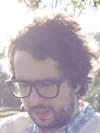
Dr Mauro Greco
School of Social and Political Sciences
Mauro Greco’s research interests are the social memories and aesthetic representations of the Argentinean recent past, especially of the last civil-military dictatorship (1976-1983). The “civil” here is very important, because both his PhD as his postdoc work are about collective responsibility during the Military Junta. The authors he engaged with were Karl Jaspers, Hans Jonas, Hannah Arendt, Jacques Derrida, Michel Foucault, Michel de Certeau and Guy Debord. This selection of intellectual interlocutors is justified by reference to Mauro's particular interest in the “little resistances” under exceptional political circumstances. Nevertheless, one problem remains at least: which Latin-American theories and thinkers can we mobilise to elaborate and theorize about what happened in the continent in the last century? Are we going to export case studies and import concepts? This is relevant as the past’s aesthetic representations are also a function of unequal geopolitical distribution.
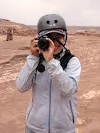
Melisa Miranda Correa
School of Architecture and Landscape architecture, ESALA
Melisa is an Architect with an Ma in Architecture from Pontificia Universidad Católica de Chile and an MPhil in Landscape Architecture at Edinburgh University. Her research is focused on landscapes of movement, management and evaluation of policies for Indigenous landscapes, participation methodologies and tenure maps. Her work experience, consists in consulting services for governmental institutions in tasks of community participation, city design and territory through multidisciplinary teams. She has been involved in public policies such as PLADECOS (Council plan for development), generation of datasets on historic assets such as national monuments, renovation of urban spaces applying PNUD guidelines, among other studies. Currently she is a Research Associate in two projects of Smart city and communities in Mexico at ESALA.
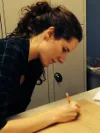
Stephanie Crane
Edinburgh School of Architecture and Landscape Architecture (ESALA), Edinburgh College of Art
Qualified Architect from Bogotá, Colombia. Research Associate in Environmental Design and Sustainability at ESALA. Since 2008 Stephanie has been involved in the design and development of architecture and interior design projects of various types and scales. In parallel, she has been contributing in academic research in the fields of sustainable design, planning and community empowerment in the UK and Colombia, as well as research dissemination through the design of publications and exhibitions. Her overarching focus is on how the dynamics between people, places, spaces can contribute towards a more inclusive, wholesome and sustainable settings.
Dr Luz Horne
School of Literatures, Languages and Cultures
Luz Horne is a Professor of Literature at the Humanities Department at Universidad de San Andrés in Buenos Aires, and holds an AHGBI Visiting International Fellowship to spend February 2019 in the UK, based at the University of Edinburgh.
She received her PhD in Spanish and Portuguese from Yale University (2005) and her “Licenciatura” in Philosophy from the University of Buenos Aires (1999). Before joining San Andrés (2010), she was an Assistant Professor at Cornell University (2006-2010) and a Visiting Assistant Professor at Northwestern University (2005-06). Her main area of research is 20th and 21st century Brazilian and Spanish American literature and culture, with a special interest in the fields of film, visual culture, cultural studies and critical theory. She has published several articles in prestigious peer-reviewed academic journals and her book, Literaturas reales: Transformaciones del realismo en la literatura latinoamericana contemporánea, was published in 2012 by Beatriz Viterbo Editora (Argentina).
While she is in Scotland, she is giving the following talks:
- Tuesday 12th February 2019 at 5pm, 50 George Square, Edinburgh, Screening Room G.04. An AHGBI workshop, hosted by the Instituto Camões in conjunction with Film Studies: "Cinema of/as Garbage: Eduardo Coutinho’s Politics of Image from Jogo de Cena (2007) to Boca de Lixo (1992)."
- Wednesday 13th February 2019 at 1pm, University of Glasgow, School of Modern Languages and Cultures. An AHGBI research seminar at the University of Glasgow: "La mirada documental en la literatura latinoamericana contemporánea (Sergio Chejfec, Mario Levrero, Valeria Luiselli y Alejandro Zambra)."
- Friday 15th February at 4pm, University of St Andrews, Byre Studio. An AHGBI lecture at the University of St Andrews hosted by the Department of Spanish: "Cultura negra y revolución: pueblo, raza y clase en la novela brasileña de los años treinta brasileira. Mar morto de Jorge Amado."
Elaine Peña
School of Social and Political Science
As an Anthropologist of Religion and a Performance Studies scholar/practitioner, Dr. Peña uses ritual, be it religious or civil, as an optic to examine U.S.-Latin American relations, transnational spatial practices, and the politics of cooperation and exclusion at international boundary lines.
Her first book, Performing Piety: Making Space Sacred with the Virgin of Guadalupe (University of California Press, 2011), examines the long-standing transnational dimensions of Guadalupan sacred space production among working-class Mexican-Americans and Mexican nationals living between the greater Chicago area and central Mexico (México DF; Zitácuaro, Michoacán, Santiago de Querétaro, Querétaro).
Her second book, The Festive Border: Ritual, Infrastructure, and Crisis Resolution at the Port-of-Laredo (forthcoming 2019), draws attention to the long-standing practice of commemorating George Washington’s Birthday at the Port-of-Laredo (Laredo, U.S.A. and Nuevo Laredo, México). The Festive Border uses a dual focus on infrastructure and ritual to examine the celebratory tradition of meeting in the middle of the Port-of-Laredo’s internationally co-owned bridge during times of crisis (e.g. hurricane damage, drug cartel violence, plans to build a border wall).
Dr. Peña’s next research project will extend her work on migration, Catholic culture, and built environments in Nuevo Laredo, Tamaulipas (México) to the Guatemala-Mexico border--Ciudad Tecún Umán, Departamento de San Marcos (Guatemala) and Ciudad Hidalgo, Chiapas (México). She will continue to explore how devotees on the move improvise and adapt religious practices to claim sacred space in close proximity to border infrastructure. At Mexico’s southern border, she will expand her research plan to include non-Christian expressions of faith.
Former staff

Dr Camillia Cowling
Department of History, University of Warwick
Dr Cowling works mainly on nineteenth-century slavery and abolition in Brazil and Cuba. She is the author of Conceiving Freedom: Women of Colour, Gender, and the Abolition of Slavery in Havana and Rio de Janeiro (University of North Carolina Press, 2013). She is working on a second book project entitled Across the Miles: Law, Geography and Human Movement in Nineteenth-Century Slave Societies (Brazil and Cuba).
Dr Elize Massard da Fonseca
Dr Elize Massard da Fonseca lives in Sao Paulo and as recently as Dec 2011 produced a report (whilst still at Edinburgh) looking at the problem of human trafficking in Brazil - a report commissioned by the United Nations on Drugs & Crime (UNODC). Released in Feb 2012, Elize says that the report has not yet received media attention. She is now a postdoctoral fellow at the Center for Metropolitan Studies (CEM) in Sao Paulo. CEM's director (Marta Arretche) has a joint project with Charlie Jeffery (head of SSPS) on social inequality.
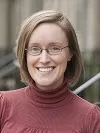
Dr Charlotte Hammond Matthews
Dr Charlotte Matthews was a lecturer in Portuguese at the School of Literatures, Languages and Cultures until 2014.
Dawn Miranda Sherratt-Bado
School of Literatures, Languages and Cultures
Dawn was a postgraduate instructor in the School of Literatures, Languages and Cultures. Dawn's PhD thesis title was "Comparing Contemporary Anglophone and Francophone Caribbean Women's Fiction: A Study of Works by Jamaica Kincaid and Gisèle Pineau." This project featured a comparative exploration of the Caribbean diasporic experience for contemporary black women writers within anglophone and francophone contexts.

